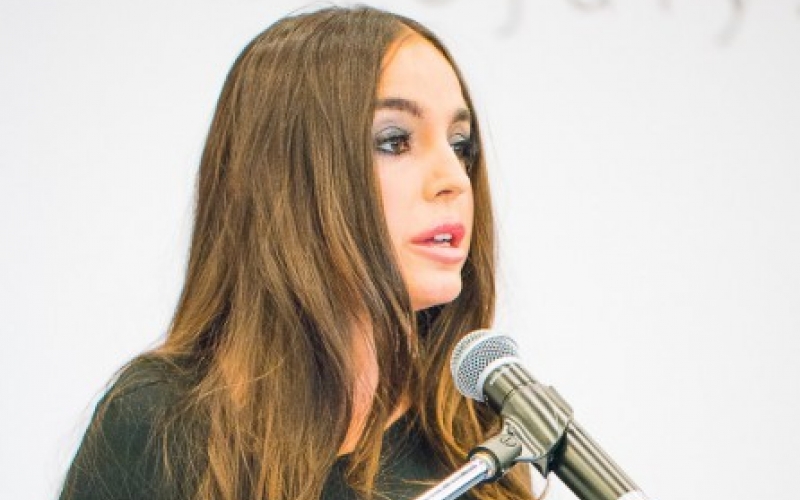
The exhibition features drawings made by students and activists of the Moscow-based Azerbaijani Youth Association (AMOR) and their Russian friends on the Khojaly theme, war, peace and justice in an online mode.
The audience honored the memory of Khojaly genocide victims by a moment of silence.
Addressing the opening ceremony, Vice-President of the Heydar Aliyev Foundation Leyla Aliyeva said that Khojaly tragedy is the most brutal and bloody page in the Nagorno-Karabakh conflict. "The conflict has lasted for nearly 30 years, and 20 percent of our territory has been occupied. Azerbaijan has more than one million refugees and IDPs. Architectural masterpieces, historical monuments connecting this region with the Azerbaijani cultural heritage have been destroyed in the occupied territories," said Leyla Aliyeva. "On February 26, 1992 the Armenian armed forces occupied Khojaly and brutally killed 613 civilians, including 63 children, 106 women and 70 old men."
Leyla Aliyeva said that “Justice for Khojaly” International Awareness Campaign was launched in 2008 to raise international public awareness of the Khojaly Genocide.
"Justice for Khojaly" campaign is being supported by dozens of countries around the world. The parliaments of Canada, Mexico, Peru, Pakistan, Serbia, Bosnia and Herzegovina, Romania, the Czech Republic, Jordan, Sudan, Panama, Honduras, legislative bodies of more than 20 states of the USA, as well as the Organization of Islamic Cooperation recognized the genocide in Khojaly. A website dedicated to "Justice for Khojaly" campaign provides full information about the tragedy.
Leyla Aliyeva pointed out that Azerbaijan has always been a tolerant and multicultural country where representatives of different nationalities and religions live in peace and harmony. "Despite the horrors of Khojaly the spirit of our people was not broken. The victims of Khojaly tragedy will always remain alive in our memories. We have arranged an exhibition of Azerbaijani artists and children. You can feel and see the tragedy through the eyes of these artists. Perhaps, these works are full of pain and grief, but we sincerely believe that the Armenian-Azerbaijani Nagorno-Karabakh conflict will find its fair solution, territorial integrity of Azerbaijan will be restored, and all refugees and displaced persons will return to their homelands", added Leyla Aliyeva.
Ambassador of Azerbaijan to Russia Polad Bulbuloglu said “a crime that was not condemned gives rise to new and even more serious crimes”. "I want to emphasize that the feeling of empathy over the Khojaly tragedy, as well as absolute condemnation of this crime should concern not only our people, but also moral and legal choice for all people of goodwill."
Russian academician Yuri Pompeyev spoke about his involvement in “Justice for Khojaly” campaign. Pompeyev pointed out that the majority of the drawings reflects tanks: "These tanks belong to the 366th regiment. But they fell into the hands of nationalists, Nazi forces. Because Serzh Sargsyan was then one of the leaders of the Armenian armed forces. That's shameful. This fact should be brought to the attention of Russian citizens, and I am trying to do it," said Pompeyev.
Witnesses of the Khojaly tragedy were among the visitors at the exhibition. The exhibition was also attended by representatives of the Russian public, diplomatic corps accredited in Moscow, politicians, employees of the Azerbaijani embassy in Russia, the Russian representation of the Heydar Aliyev Foundation, representatives of the All-Russian Azerbaijani Congress, the Azerbaijani Youth Organization of Russia.
The “Justice for Khojaly” International Awareness Campaign was launched on 8 May 2008, at the initiative of Leyla Aliyeva, General Coordinator of the Islamic Conference Youth Forum for Dialogue and Cooperation.
The campaign aims to raise international public awareness of the Khojaly Genocide, root causes and consequences of the Armenia-Azerbaijan Nagorno-Karabakh conflict and the need for the immediate and unconditional withdrawal of the Armenian armed forces from the Nagorno-Karabakh region and other occupied territories of Azerbaijan. The campaign’s activities are also directed towards honoring the victims and keeping their memories alive, particularly by constantly informing the younger generations and supporting the survivors and seeking ways to relieve their suffering. (AZERTAC)
Views: 246
